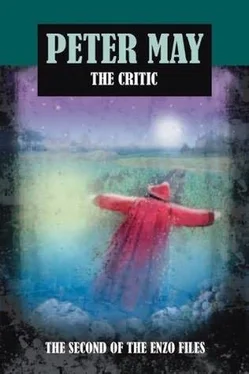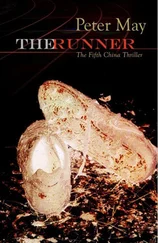Peter May - The Critic
Здесь есть возможность читать онлайн «Peter May - The Critic» весь текст электронной книги совершенно бесплатно (целиком полную версию без сокращений). В некоторых случаях можно слушать аудио, скачать через торрент в формате fb2 и присутствует краткое содержание. Жанр: Классический детектив, на английском языке. Описание произведения, (предисловие) а так же отзывы посетителей доступны на портале библиотеки ЛибКат.
- Название:The Critic
- Автор:
- Жанр:
- Год:неизвестен
- ISBN:нет данных
- Рейтинг книги:5 / 5. Голосов: 1
-
Избранное:Добавить в избранное
- Отзывы:
-
Ваша оценка:
- 100
- 1
- 2
- 3
- 4
- 5
The Critic: краткое содержание, описание и аннотация
Предлагаем к чтению аннотацию, описание, краткое содержание или предисловие (зависит от того, что написал сам автор книги «The Critic»). Если вы не нашли необходимую информацию о книге — напишите в комментариях, мы постараемся отыскать её.
The Critic — читать онлайн бесплатно полную книгу (весь текст) целиком
Ниже представлен текст книги, разбитый по страницам. Система сохранения места последней прочитанной страницы, позволяет с удобством читать онлайн бесплатно книгу «The Critic», без необходимости каждый раз заново искать на чём Вы остановились. Поставьте закладку, и сможете в любой момент перейти на страницу, на которой закончили чтение.
Интервал:
Закладка:
‘I’m hardly an amateur, Monsieur le Prefet. I’m well qualified in the art of forensic science.’ And before the Prefet could point out that it was an art he had not practised for twenty years, he added, ‘And besides, there wouldn’t be any need for amateur sleuths if the police were doing their job.’
The Prefet raised an eyebrow. ‘Prefet Verne said you were a plain-speaking man.’ There was an almost imperceptible hesitation before he reached a decision. He took out a small, leather-bound notebook and scribbled a name and number on a blank page. He tore it out and handed it to Enzo. ‘I wish you the best of luck, Monsieur Macleod. You’ll need it.’ And he turned and ran up the steps, late for his appointment with God.
II
‘I made the initial identification at the morgue three years ago.’ Laurent de Bonneval was a man in his early fifties. He was, perhaps, a year or two older than Enzo. He was tall, and willowy thin, with thick, black, curly hair, shot through with an odd streak of silver. His friendly, liquid brown eyes, were melancholy now with the memory of the moment. ‘It was shocking. I’ve never seen a human being in a state like that. It was almost as if he had been pickled by the wine, like something preserved in a jar. I suppose the alcohol retarded the process of decay. He must have been completely submerged in it for most of the twelve months he was missing.’
Bonneval turned away from the window. The blood had drained from his face, leaving his tanned skin a sickly yellow. Beyond him, fifty feet below the battlement walls of the old abbey, the River Tarn continued on its stately route west from Albi, now thirty miles upstream.
They were in the offices of the Commission Interprofessionnelle des Vins de Gaillac in the Maison des Vins, part of the thirteenth century brick-built Abbe Saint-Michel in the millennium town of Gaillac. Enzo felt a thousand years of history encased in the redbrick walls around them. ‘Why wasn’t he identified by a relative?’
‘Because no one bothered to come over from the States when they found him. He’d been divorced for several years and estranged from his daughter, apparently.’
Enzo cleared his throat self-consciously. These were uncomfortable parallels with his own life. But, then Monsieur de Bonneval wasn’t to know that. ‘So why did they ask you?’
‘He’d been tasting my wines at Chateau Saint-Michel the week before he went missing. So I’d met him. But also, I suppose, because I was president of the CIVG. I represented all the winemakers of Gaillac. Still do.’
Enzo looked at his blue-ribbed pullover with its faded elbow patches, and his baggy cord trousers, and thought he looked like an unlikely representative of winemakers. But there was something attractive about him, an avuncular quality that made him instantly likeable. ‘Police reports said he’d been dressed up in the ceremonial garb of some local brotherhood of winemakers.’
‘Yes, the order of the divine bottle- l’Ordre de la Dive Bouteille. Quite bizarre, really. The order is a brotherhood of bon viveurs in the mould of Francois Rabelais.’
Enzo knew of the famous sixteenth century French writer’s predilection for wine, and also of his infamous one-line will: I have nothing, I owe a great deal, and the rest I leave to the poor.
Bonneval said, ‘The brotherhood is rooted in an ancient society that existed five hundred years ago called La Companha de la Poda. A poda was short hand-axe they used to use for pruning the vines. But nowadays it seems the confrerie has only two purposes. The promotion of wine, and the drinking of it.’
‘You’re not a member, then?’
‘Good God, no. I’m a serious winemaker, Monsieur. I don’t have time for dressing up in crimson gowns and pointed hats.’ Bonneval smiled. ‘I don’t mind drinking the stuff, though.’
Enzo nodded. He wasn’t averse to a glass or two himself. ‘So what was Petty’s connection to the organisation?’
‘He’d been inducted into the confrerie shortly after his arrival here. Made a chevalier of the order.’
‘Was that unusual?’
‘Not for someone of his standing. He was, after all, just about the biggest name in the world of wine, Monsieur Macleod. And he’d come to taste our wines. Maybe even put us on the map. Good ratings from Petty could have made some of our vignerons a lot of money.’
‘And bad ratings could have ruined them.’
Bonneval shrugged. ‘If you’re looking for a motive, then I suppose that’s true.’
‘So,’ Enzo said. ‘Do you think you can help me?’
‘Oh, I think so, yes.’ He took a business card from his wallet and handed it to Enzo. ‘Look, why don’t you come to the chateau this evening, have dinner with my wife and me. Are you familiar with wine-making, Monsieur Macleod?’
‘I understand the process. But I’m not familiar with all the mechanics.’
‘You do enjoy a glass, though?’
‘Oh, yes.’
‘Good. We’ll have a bottle or two, and then I’ll show you around. And in the meantime, I’ll see if I can’t get you placed for a little grape-picking.’ He smiled. ‘I hope you don’t have back problems.’
III
Gaillac, Enzo reflected, as he crossed the freshly re-cobbled Place du Griffoul, was not a beautiful town. It had neither the scale nor dignity of the departmental capital of Albi, but it had a certain dusty charm. It was a working town, filled with working people. Red bricks and grapes. The smell of them filled the air, a rich, heady, fruity scent carried in waves on the breeze. It was harvest time, and the lifeblood of the town and the vineyards that climbed both banks of the river around it was being gathered and squeezed and fermented in towering stainless steel tanks at more than one hundred and twenty domaines and chateaux.
Diners were gathering in restaurants and cafes around the old bastide, and Enzo climbed the narrow Rue Charles Portal, with its ancient cantilevered buildings leaning at odd angles, oak beams and brick, glass and neon. A strange amalgam of old and new. The sun was high and hot in an early autumn sky, burnt-out and shimmering in the haze of its own heat, and people hurried home to lunch clutching warm, freshly-baked loaves. It was hard to believe that in this somnolent town in southwest France, a killer still walked free-long after his victim had been buried and all but forgotten.
The entrance to the gendarmerie was in Avenue Jean Calvet, an electronic gate opening into a hot, asphalt courtyard, bounded on its east side by an apartment block that housed gendarmes and their families. Enzo pressed the buzzer and told the girl who responded over the loudspeaker that he wanted to talk to Gendarme David Roussel.
Roussel’s office was off a corridor beyond a faded, green shuttered door on the far side of the courtyard. Gendarmes stood around in groups, smoking and chatting, and watching Enzo with idle curiosity as he crossed it. He was clearly not local. A tall man, over six feet, with an odd silver streak running back through greying, dark hair.
Roussel himself was a short man in his mid-thirties with a fine stubble of dark hair growing like velvet across a bullet skull. He had big, dark, suspicious eyes and hands that would make fists the size of Belfast hams. His dark blue pants were tucked into black leather boots, a pale blue, short-sleeved polo shirt tucked into the pants above a white belt and holstered gun. Just beneath the buttons at his neck, a dark blue square bore two silver stripes, and on his left arm, a lion rampant rose proudly on a grey shield. Both were attached to the shirt by velcro, removable for washing, and Enzo reflected on how practical the French could be.
Roussel ushered him into the gloom of his office, a small cluttered space with three desks, both windows shuttered against the glare of the outside world. A life-size cardboard cut-out of Lara Croft leaned against the back wall, thrusting outsized breasts into the room. A U2 poster was a visual counterpart to the music that played through the speakers of Roussel’s computer. Roussel positioned himself behind his desk, hands on hips. ‘Best rock group in the world.’ He allowed time for Enzo to absorb this wisdom, then added, ‘You know, there are people out there campaigning to stop prisoners being kept three to a cell. Cells bigger than this.’ He waved a hand around his office. ‘There are three of us in here-and we’re gendarmes!’ He barely allowed himself time to draw breath. ‘What do you want, Monsieur Macleod?’
Читать дальшеИнтервал:
Закладка:
Похожие книги на «The Critic»
Представляем Вашему вниманию похожие книги на «The Critic» списком для выбора. Мы отобрали схожую по названию и смыслу литературу в надежде предоставить читателям больше вариантов отыскать новые, интересные, ещё непрочитанные произведения.
Обсуждение, отзывы о книге «The Critic» и просто собственные мнения читателей. Оставьте ваши комментарии, напишите, что Вы думаете о произведении, его смысле или главных героях. Укажите что конкретно понравилось, а что нет, и почему Вы так считаете.












